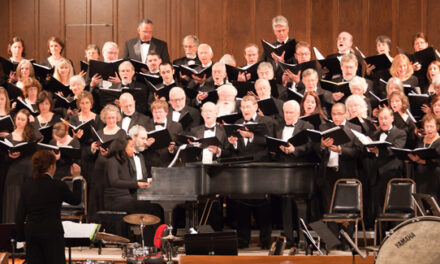Last year’s fine Raleigh run-out of Mozart’s La finta semplice did not prepare us for the high standard of achievement across the boards seen and heard in the January 30 Stevens Center performance of Don Giovanni, given by the NCSA’s Fletcher Opera Institute. Tight ensemble and precise timing belied the loss of two dress rehearsals and one technical rehearsal due to icy weather. These opera productions give almost every division of the school opportunities to ply their skills, and this one succeeded on most levels.
All the singers projected their texts with unusual clarity, and the Italian pronunciation seemed fine, too. Most of the lead singers had strong, evenly supported voices that filled the hall without signs of strain. Taken in the order of their appearance in the opera, the easy and natural comic flair of baritone Alphonso Cherry was immediately apparent in his role as Leporello, Don Giovanni’s much put-upon servant and “lover-accountant.” His dark voice made a good contrast to that of his master; he later lightened it to mimic the Don, when he was trying to lure Donna Elvira away. A hit during the repeat of the refrain of his Catalog Aria was an immensely long insert to contain Spain’s 1,003 conquests.
The full, glowing soprano of Emily Amber Newton as the raped Donna Anna was breathtaking, and her acting was outstanding. The smooth, even baritone of Krassen Karagiozov was a wonder and a delight, as was his extremely self-confident and self-absorbed portrayal of Don Giovanni. Jonathan Merritt brought a firm bass to the role of the Commendatore, outraged at his daughter’s attacker, and later, in an outstanding polished-marble-like costume, he was perfect as the vengeful ghost.
Don Ottavio, sung by tenor W. Scott Mize, is one of the most thankless roles in opera. We have never seen a fully satisfying dramatic interpretation of the role; Ottavio usually comes across as a “God help us” wimp who is not likely to hit his fiancé’s attacker with anything stronger than a summons. Besides having a good stage presence, Mize was believable in his sword fight with the Don and his projection of anger seemed genuine, but we could not warm to the unusual and individual timbre of his voice. Compared to the very open projection of the rest of the cast, he sounded as if he were singing from within a mask. I hope a virus is the explanation.
As Donna Elvira, Soprano Kristen Yarborough managed to mix termagant qualities as “the woman wronged” with almost co-dependent “stalker” traits as she hopelessly hounded Don Giovanni’s trail. These schizoid aspects were unusually prominent in this production. The Zerlina of soprano Alice Dawson was more traditional in approach if less duplicitous than is often the case. Rich-toned baritone Jason McKinney was outstanding as Masetto. The tall, sturdy singer has considerable stage presence and created a cleverer and more resourceful peasant than usual. His well-rounded and warm voice would have been welcome as either Don Giovanni or Leporello and we look forward to hearing him in other roles. Many of these singers are students of the NCSA’s Marilyn Taylor, a favorite artist of ours. McKinney and Cherry are listed in the program as guest alumni.
James Albritten conducted a vibrant and stylish performance, eliciting fully professional orchestral sound from the pit and the large onstage orchestra that provided music at Don Giovanni’s house late in Act I. All the players are NCSA students. The harpsichord continuo of Angelia Vanstory Ward was effective. We loved the lute stop used during Don Giovanni’s famous “Deh, vieni alla finestra.”
Supertitles were unusually crisp, clear, and large. Kudos to Nancy E. Goldsmith for her pithy and witty translations and fine program notes.
Stage Director Steven La Cosse was presumably responsible for much that was dramatically effective. We were very impressed with stylized building shadows that shifted against the back of the stage. Recessed stage floor lighting was a welcome innovation. We are developing an allergy to an “international style” that uses stage sets that appear as scaffolding, left over from some low-bid paint job. A shallow balcony along all three sides provided a variety of levels for action; in addition to much else, Lighting Director Klyph Stanford deserves praise for keeping much of that balcony in the dark. Sliding doors like those in Japanese houses allowed for diverse exits. On balance, the work of Scene Designer Raber Umphenour was very effective, our scaffolding allergy aside. We liked the traditional 18th-century-style costumes by Katrina Cunningham and the wigs and makeup provided by Christina Grant. Gluck would have appreciated choreographer Rick McCullough’s contribution to the surprising descent to Hell, and this production also benefited greatly from Dale Girard’s fight choreography.
Don Giovanni is repeated today (2/1) at 2:00 p.m. in the Stevens Center. See our Triad calendar for details.











